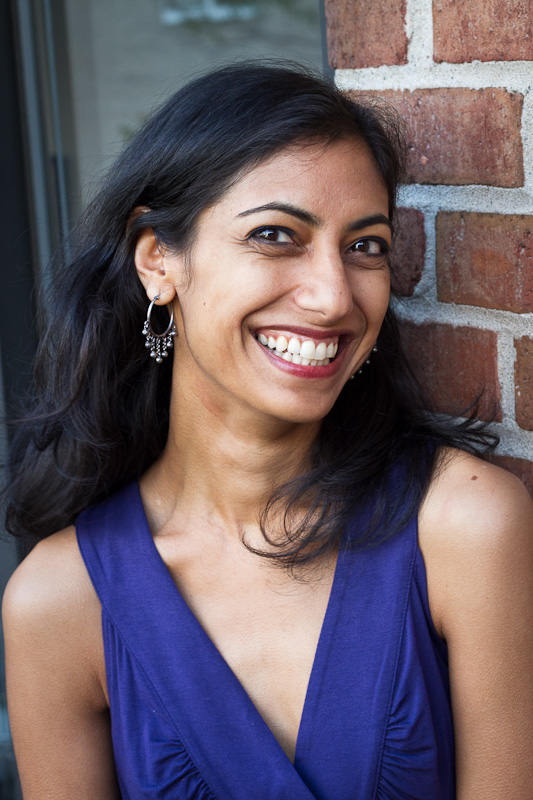Fall 2020
3
A Kind of Prayer:
Profile of Sejal Shah
Abriel Newton, Contributing Writer (Class of 2021)
A Kind of Prayer: A Profile of Sejal Shah

Abriel Newton
Contributing Writer
Class of 2021
What did we do when we were stuck at home during this pandemic, quarantined with our children, the only acceptable outing a trip to the grocery store or a walk? Sejal Shah, a new faculty member at the Rainier Writing Workshop, danced on Zoom, having reconnected with her teacher of Indian classical dance, Rathna Kumar, after thirty years. And these connections with dance and her guru were paramount. Sejal’s debut memoir in essays, This Is One Way to Dance (University of Georgia Press, June 2020), was set to be published soon, and because dance had been so important in Sejal’s life, she included Kumar in her acknowledgements. Sejal writes in an article for The Guardian, “Dance is a kind of prayer, a way to celebrate and move through something, and also to mourn… Dancing with my guru again, 30 years after I last saw her, is an astonishing gift of the pandemic. After hours disembodied before a blue-lit screen, I have to remind myself, we need to move more than fingers and eyes. We need community.” We welcome Sejal Shah as a faculty mentor in our RWW community.
The daughter of Gujarati parents who immigrated to the United States from India and Kenya, Sejal lives in her hometown of Rochester, New York. She is the recipient of a 2018 New York Foundation for the Arts (NYFA) Fellowship in Fiction, and residencies or fellowships from Blue Mountain Center, the Kenyon Review Writers’ Workshop, Kundiman, and The Millay Colony; her stories and essays have appeared in Brevity, Guernica, Conjunctions, the Kenyon Review, and Longreads, among others. Sejal’s current project is a memoir about mental health, and she has presented her work on invisible disability and neurodiversity as an invited keynote speaker at conferences at Princeton University (2019) and the University of North Carolina at Charlotte (2020).


Sejal Shah. Photo by Preston Merchant.
Sejal teaches creative writing privately and in community-based workshops, such as at Writers & Books in Rochester, where she teaches students her own age, younger, older, with children and jobs and wide-ranging lives, parent-writers, dancer-writers, barista-writers, and teacher-writers. She supports students with complicated and shifting identities, cementing the notion that “what’s most important is to support and nurture their work.”
Sejal likens writing to dance and movement, which affects much of her way of teaching; she says in an interview with Rudri Bhatt Patel in BOMB Magazine, “You can observe any five people dancing the same choreography and it will look different: how we move, how we are able to move; what we carry, our history.” Through this lens, our writing is incredibly individual, and Sejal gives mentees that respect, avoiding prescriptive feedback. In an interview with Anjali Enjeti in Lit Hub she says, “Mostly, in my teaching, I want to center the writer as the person who articulates the kind of feedback they want, what sort of draft it is, what their goals are for a piece of writing, and who their audience is. I try to be aware of what my biases are as a writer and reader and that my opinion is just that, an opinion. I’ve been writing for longer than some of my students, but I’m not much of a believer in hierarchy. I learn from my students, too.”
“I’ve been writing for longer than some of my students, but I’m not much of a believer in hierarchy. I learn from my students, too.”
On her website, Sejal describes her pedagogy as “informed by mindfulness and meditative practices,” and long years of studying dance and movement; she views writing as a “physical act,” and believes that these movement experiences have “fundamentally altered [her] approach to writing and teaching.” Sejal took this belief into crafting This Is One Way to Dance, an essay collection reflecting on culture, family, language, and place. During her morning talk on genre slippage at the 2020 Summer Residency, Sejal noted, “Lyric or braided, traditional or flash, essays have granted me space to stretch, pivot and grow. Meditate, ruminate and weave. I dwell and revel in the spaces between.”
When asked during the Boston Book Festival for advice to writers, Sejal replied, “Trust yourself… [R]eally what you have is your voice. It’s like a fingerprint. And…that’s what we have to give to the world. It’s your particular way of looking at the world.” In her teaching statement for RWW, she says, “I hope to add to your toolbox, to extend possibilities: a chisel, an anvil, a mirror, eraser, thumb tacks, sparkle, glue, watercolors; a screwdriver, rubber bands, lists, names, stickers. Together, we will work to identify what matters most to you in your writing, reading, practice, work, and play… You are here to write, right now, for a reason. Let’s begin.”
